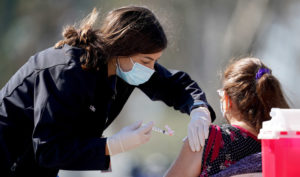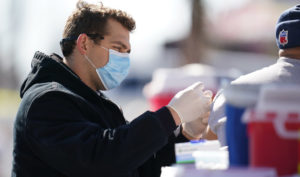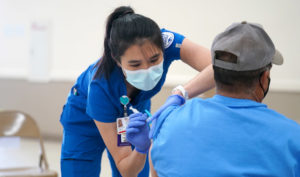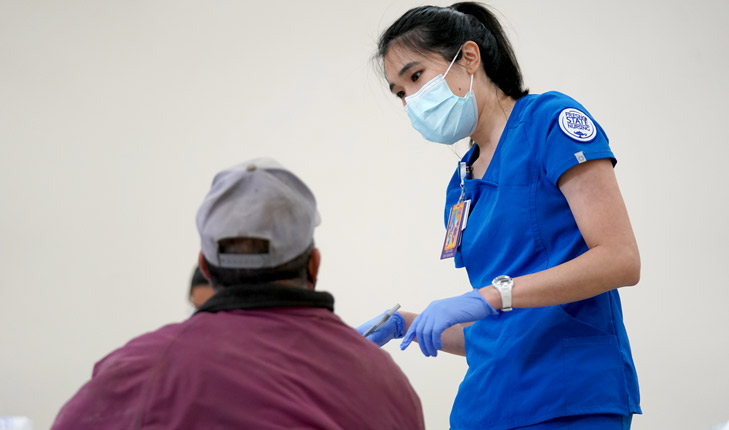
Danielle Pacheco
The line wrapped around the Orange Cove Community Center increases by the hour as the crisp morning dew starts to dissipate. Among those in line are some of the Central Valley’s most vulnerable communities — farmworkers and individuals age 65 and up who are waiting to receive the COVID-19 vaccination.
They are among the first group in the region to receive the vaccine.
Inside the center, Fresno State nursing student Danielle Pacheco prepares to administer the first dose of the Moderna vaccine to a migrant worker who appears to be in his 60s. He rolls up his sleeve slowly and Pacheco inserts the shot with careful precision. He lets out a hesitant, but hopeful sigh. For many of the migrant workers lined up this February day, this brings renewed optimism for their health and livelihood.
Since February, these pop-up vaccine clinics have been made possible through a partnership between the Fresno State School of Nursing and local community organizations and government agencies, including the Fresno County Department of Public Health, Assemblymember Dr. Joaquin Arambula, Saint Agnes Medical Center and Cultiva La Salud.
The clinics have visited rural communities where access to health care — and the vaccine — are not readily available. Over 60 nursing students have helped to administer over 3,700 vaccines.
“Not a lot of people getting vaccinated here today would necessarily leave their community to get the vaccine,” said Pacheco, who is in her fifth semester of the nursing program. “So, in that sense, it’s been so rewarding to be able to come out to these rural communities and to be able to give back in this way. Seeing where they’re from makes it so much more impactful.”
Before students can volunteer at the vaccine clinics, they must each complete a comprehensive, two-hour COVID-19 vaccine training course, as required by the School of Nursing.
“We couldn’t meet this pandemic head on if it were not for the partnerships that we’ve established and by our community leaning on and supporting each other,” Arambula said. “I believe that the work we are doing allows us to be one step closer to getting back to life as we know it. It is an honor to work alongside these nursing students who are out here on the frontlines doing the hard work to help us to become a safer community.”
Students volunteer for a variety of roles, including client intake and screening, preparation of vaccines, administration of the vaccines and the observation station.
“While they are gaining experience in assessing, instituting an intervention and monitoring the effect, the students are gaining compassion and giving back to the community,” said Dr. Sylvia Miller, chair of the School of Nursing at Fresno State.
Serving with gratitude
A few blocks south of the Fresno Fairgrounds lies the unincorporated community of Calwa. The beginning of the spring season is evident as the sun shines down on a group of community members awaiting their vaccines. Fifth-semester nursing student Joshua Hinson has been at the clinic since it opened four hours earlier. Despite the long hours, Hinson is optimistic and excited to be there helping his hometown.
“Every single person I’ve come across has been very thankful,” Hinson said. “You can tell how much they genuinely appreciate you being out here, and the feeling is mutual.”

Joshua Hinson
For Hinson, the battle to beat COVID-19 hits home. His grandfather passed away from the disease in January. He says that being on the other end, helping to stop the spread, is gratifying.
“This has been a real eye-opening experience,” Hinson said. “As nurses, we want to help people and keep our community safe, and being out here on the frontlines helps us do that.”
Like thousands of others in Fresno County, many of the students have been personally impacted by COVID or know someone who has. Since the pandemic hit the region about one year ago, Fresno has seen over 96,000 cases.
Being on the frontlines of the pandemic is not something students imagined, but they were eager to step up to the plate.
“Every student is volunteering their time and some have come out two or three times already,” said Dr. Kathleen Rindahl, faculty coordinator of the mobile health unit in the School of Nursing. “They’ve come to the realization that, as nurses, we have a responsibility to help in these kinds of situations and they are just rolling up their sleeves to do it.”
Giving back to the Valley
In Cantua Creek, a remote community about an hour southwest of Fresno sitting at the border of San Joaquin and Tranquility, nursing student Holly Vu prepares to administer her first dose of the vaccine. Although she previously volunteered at other sites, administering the shot was new to her.
“It is a humbling experience to be a part of the solution to this pandemic,” Vu said. For many of the individuals receiving vaccines, feelings of uncertainty and fear still linger, but Vu said being able to educate them on the vaccine has been meaningful.”

Holly Vu
Vu still finds it hard to believe she is out in the community doing what she loves. After 10 years of working in the IT field, she returned to school a few years ago to pursue her bachelor’s degree in nursing.
Now in her fourth semester of the five-semester program, Vu said she is ready to take on the challenges of the profession at the peak of the pandemic. Serving the Fresno community, where she was born and raised, is what she always aspired to do.
“I remember from personal experience, my mom — a single mom of five — taking us to free health care clinics just like these when I was growing up,” Vu said. “It is so important for me to give back now as a health care provider because my community has given so much to me. With the prevalence of COVID, I want to be a part of the work that protects our elderly population, and our community. This is why I chose to be a nurse.”




